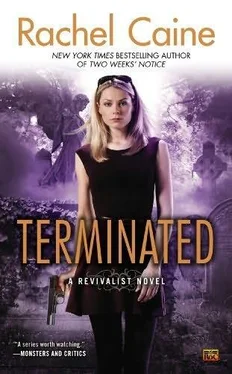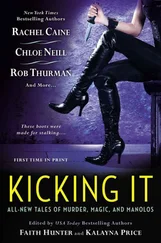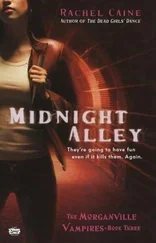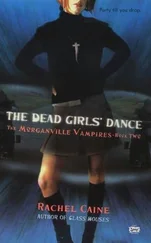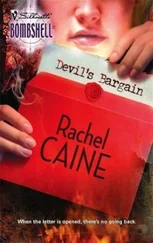Joe silently offered her a thick piece of beef jerky. Peppered. She took it and chewed; she hadn’t even realized she was hungry, but she quickly downed six pieces from his stash, to his evident amusement. Riley needed less, but she ate, too. Bryn thought about asking where they were going, but it honestly didn’t make much difference, because the only alternative was a jump out the door, and from this height she didn’t really look forward to the recovery.
It was a relatively short ordeal, at least, and the aircraft touched down again within an hour’s flight. Still desert, so they’d likely gone west, though Bryn’s sense of direction was never good in the sky. There was an excellent reason she’d never signed up for the air force.
Once they were out of the bird and on solid, sandy ground, she realized they’d been let out . . . nowhere. There was a single small concrete building, well pitted with age and wind. Big enough to be a small closet, nothing more. No windows. One thick steel door that had once been painted some color, but had now faded to a dull off-tan that matched the sand.
The helicopters weren’t landing here, she realized; once the five of them were out, they immediately dusted off again and beat rotors on the sky heading east. The silence of the desert was stunning, after they’d disappeared toward the horizon. One of the quietest places in the world, she’d always thought, and it seemed even more hushed here than she expected.
Pansy said, “Welcome home.” She spread her hands to indicate the expanse of nothing that surrounded them. It was inhospitable as hell, and Bryn couldn’t imagine who’d want to call it home beyond snakes and lizards. It felt ancient here.
And it felt unwelcoming.
Pansy walked to the small concrete structure, pressed her hand flat on the center of the door, and waited. After a few seconds, the door sagged open, with an audible hiss of air.
“Hope you’re all okay with stairs,” she said. “It’s a long way down. Watch out, it’s steep.”
Inside, the lighting was dim, from inset wire-covered fixtures that had a distinctly cold-war era look to them. Concrete, and narrow, steep stairs descending. Nothing else except a bright yellow sign, only slightly faded, that read HIGH SECURITY AREA—KEEP ID VISIBLE AT ALL TIMES.
Bryn pulled the door shut behind her, and felt a shiver as it locked with a heavy, forbidding clunk .
Then she followed the rest of them down the steps.
She counted more than a hundred before she gave up. There were periodic flat landings, which helped them all catch their breath, but by Bryn’s estimate they went more than six stories down . . . and then arrived in a large, bare room with nothing but another door.
This one, though, had no keypad, no sensors, no handle on the door. Pansy simply waited, face upturned to a domed observation camera above the entrance, until it clicked open as well.
Another missile base, Bryn thought, but it turned out she was wrong.
“Welcome to BHC-One,” Pansy said, and led them down a clean, arcing hallway with blue carpeting. “That stands for biohazard containment, by the way. Back in the day, this was where the government tinkered around with nerve gas, and then it was refitted to explore infectious agents like anthrax, botulism, lethal influenza, and hemorrhagic fevers. Anything with a rapid infection rate and high kill percentage ended up getting grown and evaluated here, all the way through the late eighties,” she said. “When they mothballed the place, they disavowed it ever existed. Most of the equipment was too expensive to remove, and nobody wanted to take responsibility for destroying the place, so it just . . . stayed here. Manny took it over ten years ago. It’s been our home ever since.”
“Home,” Bryn repeated. “I thought you didn’t actually have a home.”
“It’s where we keep what’s important to us,” Pansy said; she sounded more serious than Bryn had ever heard her. “It’s our last stand. So yes. Home.”
The upgrades to the facility must have been made in the late sixties or early seventies . . . It had that vaguely futuristic, sterile, spaceship feel to the design, including the oddly shaped doorways. Everything had, no doubt, started off sleek and white, but the plastic hadn’t aged well . . . most of it looked yellowed now.
“Yeah, I can see why you love it,” Joe said. “Comfy.”
That made Pansy finally smile, a little. “This way.”
She took a turn to the right, down another weirdly curving hall, and then opened up a door on the left.
The room was circular, midcentury modern in style, and finished out the same way, with a round bed and vaguely futuristic chairs and desks. A wall-mounted flat TV didn’t look out of place in all that.
Neither did Annie, who was lying on her stomach on the bed, watching Star Wars unfold on the plasma screen. Her wavy hair cascaded over her back, and she was wearing pale pink shorts and a white tank top, and Bryn had a flashback to seeing her in exactly this position, even to the crossed ankles and her fists wedged under her chin.
She’d been fourteen then. She looked just as young now.
“Bryn!” Annie exploded off the bed in a rush, grabbed hold, and danced Bryn around in a dizzying whirl. “Oh God God God, I knew you weren’t dead, they told me you had to be, but I knew it ,you bitch, how could you do that to me. . . .” Annie ran out of words and just hugged her, and Bryn hugged back.
Mr. French came charging out from under the bed, barking excitedly, jumping at their feet and shins.
Home.
It felt that way.
“She’s fine,” Pansy said. “I told you she was.”
Bryn pushed her sister back and held her at arm’s length. She looked . . . great. Not a scratch. “They haven’t experimented on you?”
“Manny? No way. He just gives me the shots I need—that’s it. I talked to the fam a week ago—well, Mom and Grace, but they’ll tell everybody else. I lied. I said we were together, and we were fine. Had to keep it short, you know? But they’re not worrying. And they’re all safe. Brick has people watching.” Annie studied her face, and Bryn saw the worry in her eyes. “You look bad, honey. What happened to you?”
“Later,” Bryn said. “As long as you’re okay, I’m okay.” She turned to Pansy, who was leaning against the door. “I assume Manny wants us.”
“Manny is chewing through the straps on his straitjacket in his eagerness,” Manny’s voice said. It came from inset speakers in the slick plastic ceiling. “Pansy, quit playing happy families and get them up here. Now.”
“Yes, o master,” she said, and flipped him off.
“I saw that,” he said.
“He didn’t,” she told them. “No cameras in the rooms. I insisted. But come on. He needs to talk to you.”
“Annie comes, too,” Bryn said.
Pansy sighed. “Fine. But leave the dog.”
Bryn ignored that, too. Mr. French was too excited to be left behind, and she let him trail along after them.
There was, it seemed, an elevator after all, in the central core; it whisked them up a couple of floors, and Pansy got them past more security doors, into what seemed to be . . . an office.
Manny’s office.
He had a big white desk, chair, a shocking red rug, and a few guest chairs that matched the bloody color. Modern art on the walls that seemed weirdly avant-garde for someone like him, but Bryn had learned not to assume anything, by now.
Liam was standing next to the desk, reading a report from a file folder. He put it down as they filed in, and greeted them all with a nod and smile—but no handshakes or backslaps, not now.
Manny glanced up. He was wearing the square reading glasses again, punching keys on a laptop as if they’d done him personal wrong, and he kept typing as he said, “Never thought I’d see any of you again.”
Читать дальше
